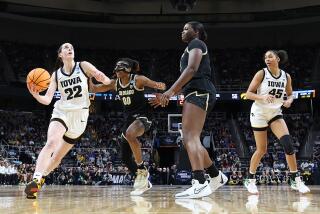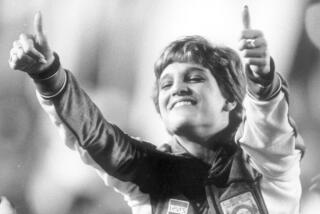Katie Taylor fights for her country and her sport
LONDON -- History told us of Babe Didrikson Zaharias, then of Fanny Blankers-Koen. Legends grew around Dawn Fraser and Olga Connolly; also Joan Benoit and now Kim Rhode.
They are Olympic women. Hear them roar.
Someday, given what took place at a boxing arena in the far reaches of the London Olympics on Monday afternoon, the name Katie Taylor may be on the list. It was just four rounds of superb boxing by the young woman from Bray, County Wicklow, Ireland. Nor was it unexpected. She is a four-time world champion.
But often, it is the surrounding story — the how more than the what — that drives the moment. Taylor’s predecessors are proof.
Zaharias won two gold medals and a silver in track and field at the 1932 Games in Los Angeles. She was such a great athlete that she not only excelled at several sports but made it fashionable for women. In the ’32 Games there were 117 events, 14 for women; also 126 women competing, or 9% of the field.
Blankers-Koen, the “Flying Housewife,” won gold medals in London’s ’48 Games in the 100, 200 and 80-meter hurdles and 4x100 relay. She was 30, the mother of two, and it was not until the hometown Dutch media added things up with the birth of her third child that the world learned she had been pregnant in London.
Fraser rose from a working-class family in Sydney to win the 100-meter freestyle in swimming in three successive Games, starting in Melbourne in ’56. Olga Fikotova won the discus in Melbourne for communist Czechoslovakia and fell in love during the Games. She married U.S. gold-medal hammer thrower Harold Connolly and competed for the U.S. in each Olympics through Munich in 1972.
Joan Benoit breezed into the Coliseum in ’84 to win the first Olympic women’s marathon. As recently as 1960, the Games had banned women’s events longer than 200 meters.
Just last week here, Southern California’s Rhode faced the pressure of trying to become the first U.S. athlete with five medals in five consecutive Olympics in an individual sport. The skeet shooter faced 100 targets and hit 99. No surprise, a gold medal, and a world record.
Enter Taylor, the beloved daughter of Irish sport, whose introduction Monday to the rest of the world was spectacular.
As luck had it, her opponent in the 125-132-pound division was a Briton, the very good and popular Natasha Jonas. The Irish against the Brits in anything will fill the stands and stir the blood.
Also, as luck would have it, this was only the second day of the first women’s Olympic boxing program. That brought lots of media attention.
The back story is that women’s boxing entered the Games through the back door. The International Olympic Committee had dropped softball for reasons still unclear. That caught it short of its gender-ratio goals. Voila! Women’s boxing.
But the IOC constantly reviews its program. Women’s boxing needs to show its worth.
Along comes Taylor, who carried the flag for Ireland in the opening ceremony and who not only boxes on an international level for her country, but also plays soccer and Gaelic football. Every seat was filled. The green Irish shirts faced the blue British shirts. Writers from Dublin regaled those new to the Katie world with stories of how she trains in a gym “next to the Harbor Bar and has to go into the pub to use the toilet ‘cause there isn’t one in the gym.”
(Has there ever been an Irish anecdote without a reference to a pub?)
The bell rang for the first round and Taylor and Jonas were on each other. Action, every minute. Taylor connected — as she did often — and the green seats erupted. Then Jonas and the blue seats. The women fight four rounds of two minutes each. Taylor and Jonas produced eight minutes of nonstop action.
Veteran boxing writers who had shown up expecting to characterize this as little more than a political gesture toward equal-opportunity brain damage inched forward in their seats. This was real boxing action — Manny Pacquiao before the Timothy Bradley farce; Jose Luis Castillo-Diego Corrales, ’05.
Jonas was good, Taylor was better and won a clear decision. The place rocked, the show was magical and the media took note.
Somewhere in the expensive seats, where the IOC relics sit, the noise presumably awakened at least one, who paid heed and will vote yes on women’s Olympic boxing next time.
The Olympic legend of Katie Taylor begins.
More to Read
Go beyond the scoreboard
Get the latest on L.A.'s teams in the daily Sports Report newsletter.
You may occasionally receive promotional content from the Los Angeles Times.







